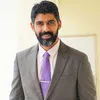An autoimmune disorder made this founder launch a gut microbiome startup
California-based Thryve provides gut microbiome testing, personalised nutrition, and customised probiotics designed by experts from MIT, Stanford, Harvard, Purdue, and UC Davis.
Richard Lin, who had worked for the likes of SAP and startups like Deliv in the US, struggled with chronic autoimmune pain for years. After multiple tests, he discovered that the flora in his gut microbiome could aid his healing.
He decided to start Thryve in 2016 in California.
“After my personal journey back to health, I wanted to create a successful roadmap for patients looking for education, guidance, and support to fuel a thriving gut microbiome. Even after intensely studying the topic of gut health, I was left with more questions than answers. There was a need for education on this topic, and personalised, realistic offerings to help others take control of their digestive wellness,” Richard says.
Thryve provides gut microbiome testing, personalised nutrition, and customised probiotics designed by experts from MIT, Stanford, Harvard, Purdue, and UC Davis.
Using gut microbiome analysis and microbiome sequencing technology to determine the right probiotic strains, and prebiotic foods for each individual to boost the good bacteria and weed out the bad, Thryve helps customers take charge of their gut health so that they can feel their greatest.
“Thryve’s goal is to improve customers’ quality of life by empowering them with their gut microbiome data, probiotics, and science-based nutrition and diet recommendations,” says Richard.

The team
The original core team at Thryve consisted of three co-founders. Richard (CEO), Sang (CTO), and Jun (CSO). Richard brought years of experience launching software products at companies like SAP and startups like Deliv. Sang is a computer science major from Boston University. Jun has a PhD in Immunology from Stanford University.
“We then hired a team of software engineers (3X) to help scale the digital product experience. Furthermore, since we had a physical product (test kit + probiotics), we built our first in-house shipping and fulfilment team,” Richard says. Thryve now is a team of 22 people.
The initial prototype cost about $500,000, and about two years to build the product. The team has raised initial undisclosed capital.
In 2020, Thryve developed its first personalised, predictive, and preventive solution utilising metatranscriptomics services with nutritional and natural supplements for interventions, to improve quality of life, health, and wellbeing for everyone.
Workings
Customers order Thryve's DNA test and are prompted to provide a stool sample. The sample comes from the toilet paper (a very small amount). The customer ships that to our lab through our prepaid envelope. In one or two weeks, the lab finishes processing and the customer is notified.
Once logged into the app, they can review the thousands of bacteria in their sample, how they relate to their health, and recommendations to improve it. The health report provides details on inflammation, food sensitivities, sleep hormones, metabolism, immune health, digestive health, cardiovascular health, and more. The recommendations are personalised pro/prebiotics and food recommendations.
Utilising a proprietary mixture of chemicals, Thryve gut tests the preservation of the microbiota profile. A physical colour indicator when enough stool is added into the mix is the first of its kind for microbial collection.
“We utilise 50,000+ research articles on the microbiome to provide a comprehensive report for the customer. Furthermore, our test uses cutting edge 16s rRNA next-generation sequencing to analyse their sample to provide a detailed view of all the species of bacteria in their gut. We then use that information to personalise a report for them,” Richard says.

Focus on chronic illness
Thryve’s focus is on innovations that help people with chronic illnesses to manage their condition and address larger public health issues facing many people around the world.
Utilising DNA testing of the gut, and customer observations and knowledge of their symptoms through surveys, the team personalises nutrition and supplements (probiotics) to address symptoms related to chronic illness in order to improve health outcomes.
Additionally, Thryve’s diet recommendations help individuals understand how their gut handles different foods, enabling them to adhere to a proper nutritional plan that leads to optimal health.
Revenue and ops
Thryve follows a B2C and B2B model. Currently, Thryve has operations across the US, and has started part of its operations in India.
While the team hasn’t disclosed how much they charge their customers, Richard adds that they have a mid 7-figure revenue run rate, with a mid 5-digit customer base, and are growing at about 18 percent month-over-month.
By starting out in metatranscriptomics, Thryve has built one of the largest unified and high-quality databases on the microbiome in the world. The startup's massive gut microbiome datasets allow for hypothesis generation and exploratory research for the growing market demand for supplements (i.e., probiotics, prebiotics, and synbiotics), diagnostics (i.e., biomarkers for early detection), and microbiome therapeutics (i.e., for chronic gut-related illnesses).
Richard says that compared to off the shelf probiotics, Thryve is different in several ways, including
- Personalisation - Thryve makes use of DNA testing to find the best probiotic strains needed to improve health. OTC probiotics are generic one size fits all.
- Digital-first - Through their app, Thryve is able to follow customers in their health journey and enable continuous improvement based on their data.
Future plans
Startups like Bugworks, BugSpeaks and few others are focused on innovation to help in chronic illnesses. According to a review on Antimicrobial Resistance (AMR), infections take 50,000 lives every year in the US and UK alone.
Now the data for countries in Asia and Africa could take the number well over a million. The AMR predicts that this number could reach 10 million by 2050.
“Our goal is to become the Apple of DNA by changing healthcare from 1.0 (reactive) to 2.0 (personalised, predictive, preventative). By utilising what we call OMICS as a Service (OaaS), metatranscriptomics (microbial DNA), genomics (human DNA), and exposomics (environmental DNA), we’ll be able to predict health outcomes based on genetic susceptibility and utilise natural means (supplements and food) as medicine to prevent or cure chronic illness,” says Richard.
Edited by Anju Narayanan











